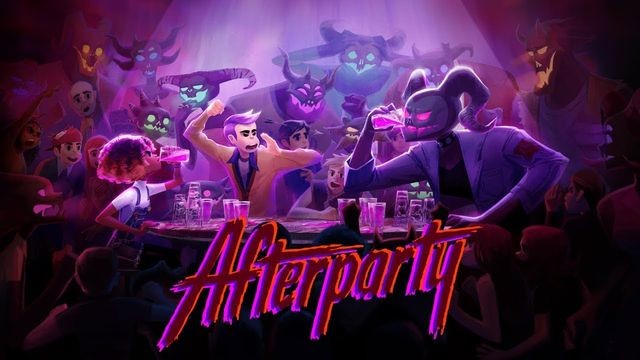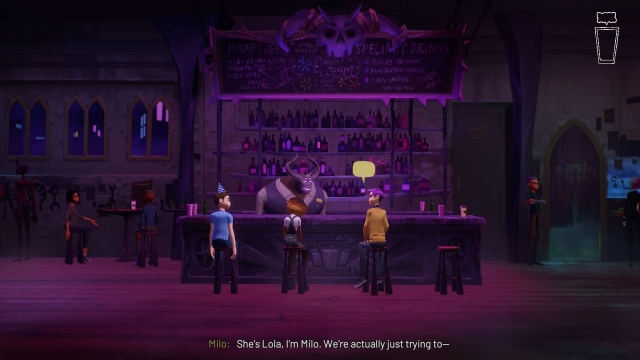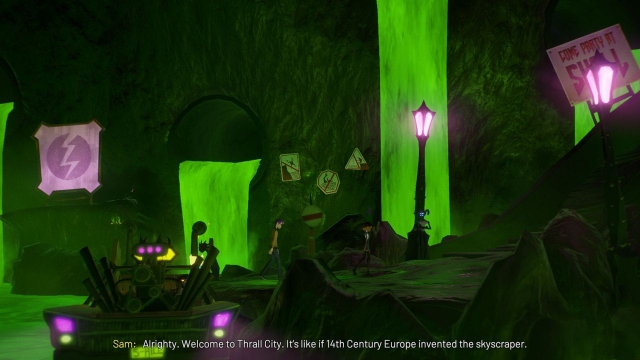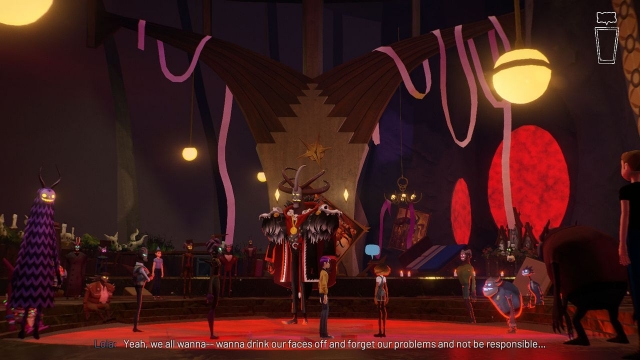Afterparty

Afterparty is the latest game from Night School Studio, the developer behind Oxenfree and Mr. Robot (both unplayed by me). In it, you control Milo and Lola, two normal(ish) college grads who die and get sent to Hell. Their arrival at the non-Pearly Gates disconcerts them, of course, but luckily Hell is a business, and it closes for the day right before they can be assigned to their eternal torment. This gives them a night to wander around, talk to people, and try to escape.
Afterparty is a strange game. It looks like an adventure, and it sounds like an adventure, but there aren’t any puzzles. Instead, you pretty much just walk around and talk to people, sometimes speaking as Milo, and sometimes as Lola. Eventually, you learn that Lucifer — Luke to his friends — has a “Get Out of Jail Free” card. If you can outdrink him, then he’ll let you go. Of course, you can’t just walk up him and challenge him. First you have to figure out how to get into his house, and then you have to show that you’re worthy of the battle. And THEN you have to outdrink him. No problem, right?
The interface for Afterparty is what you usually see with an adventure. You left click or use the WASD keys to move, you left click or press the spacebar to talk to people, and you right click to drink. Yep, that’s right, there’s a dedicated mouse button for drinking, which is a big clue about the focus of the game. Scenes scroll to the left and right as you walk, and every so often you have to call a taxi (aka “fast travel”) to move to a different part of Hell. You don’t pick anything up (other than drinks), so you don’t have to worry about your inventory. You also don’t have to worry about saving. The game only has auto-saves, and the saves happen frequently enough so you can leave at any time without losing much progress — but also so you can’t replay scenes to try and get a better result.
The dialogue in Afterparty is well-written… but, man, did I hate it. That might seem like an odd thing to say, but there you go. The dialogue is roughly six hours of drunken twenty-year-olds talking about themselves, their relationships, their jobs, and drinking. I know Afterparty is supposed to be depicting Hell, but it’s supposed to be Hell for Milo and Lola, not me. Anyway, I had trouble playing the game for more than a half hour at a time. Too much inane chatter sends me fleeing in the opposite direction. Every time I saw the auto-save symbol pop up, I got happy, because it meant I could leave.
But on the good side, Milo and Lola have a nice rapport together, making it easy to believe that they’re lifelong friends, and eventually I got interested in how the game was going to end for them. Were they going to escape? Become more than friends? Give up on each other? The game leaves all of these questions open until the very end. Also nicely, the voice acting is terrific. Night School brought in some veteran voice talent, like Dave Fennoy (The Walking Dead) and Ashly Burch (Life Is Strange), and the actors did an excellent job of selling their lines, which makes it easier to listen to the dialogue, even if you don’t like the dialogue.
Afterparty is short — I finished it in about six hours — but there are a lot of branches in the story, giving it some replay value. Several times during the game, you’re assigned a task, and you’re given two options for completing it: one where Milo leads, and one where Lola leads. For example, at one point you have to impress a devil, and you can do this by winning a dance-off against him (Milo) or reuniting him with his ex (Lola).The story always merges back together after the branches, so it doesn’t matter which one you pick, but you have to play twice or more to see everything.
As I played Afterparty, I kept thinking that I should be liking it more than I was. A character- and story-driven game sounds like it should be right up my alley, and I can picture people enjoying the conversations and appreciating a vision of Hell where it’s being run by devils with just as many problems as everybody else. But I didn’t like the game, and I didn’t really like that there isn’t much game in the game (there aren’t any puzzles, and the drinking mini-games are so inconsequential it doesn’t even matter if you win them). So I’m giving Afterparty a lukewarm score. It’s definitely a game where your mileage may vary.
Reviewed By: Steven Carter
Publisher: Night School Studio
Rating: 70%
——————————————————————————–
This review is based on a digital copy of Afterparty for the PC provided by Night School Studio.
 Game Over Online
Game Over Online











